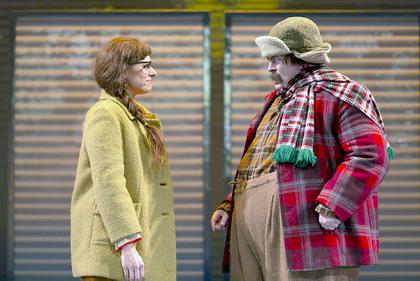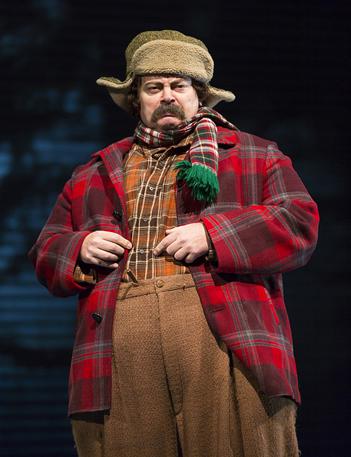Play (2015)
by Jeffrey Hatcher
based on the novel by John Kennedy Toole
Directed by David Esbjornson
Huntington Theatre Company
Boston University Theater, Huntington Avenue, Boston
Symphony Hall area
November 11 – December 20, 2015
With Nick Offerman (Ignatius J. Reilly), Stephanie DiMaggio (Myrna Minkoff/Lana Lee), Paul Melendy (Patrolman Mancuso), Ed Peed (Claude Robichaux), Anita Gillette (Irene Reilly), Wayne Barker (Bartender/Pianist), Talene Monahon (Darlene), Arnie Burton (Dorian Greene/Mr. Gonzalez), Phillip James Brannon (Burma Jones), Steve Rosen (Sergeant/Gus Levy), Stacey Yen (George/Mrs. Levy), Julie Halston (Miss Trixie), Lusia Strus (Santa Battaglia), Lonnie Farmer (Mr. Watson/Mr. Clyde), David L. Harris (Trombonist)

Nick Offerman as Ignatius J. Reilly
in “A Confederacy of Dunces”
Photo: T. Charles Erickson
Courtesy of Huntington Theatre Company
Ignatius J. Reilly (Nick Offerman), who lives in New Orleans, is a character, to say the least. Very overweight, and adorned in a series of circus-like outfits, he has the bearing of an elevated ironist, someone whose questioning and quizzical perspective invades just about everything.
At thirty, he lives with his mother, Irene (Anita Gillette), who worries that he’ll never be adjusted. If he gets a job, he loses it, and does not particularly seem to worry about that. He spends a lot of time in his room, with erotic self-possession that causes the bed to shake, also of great concern to his mother.
A lot of people populate his world, from the exotic dancers at the local bar to the undercover cop who enters with a different costume at every turn. The main question the story raises, it seems, is whether Ignatius will ever be able to break out of the holding pattern in which he is caught.
Thankfully and promisingly, he has a correspondence with Myrna Minkoff (Stephanie DiMaggio), a girl he knew from college, who seems to tap into and appreciate his distinctiveness, and even, courage.
Intended as a comedy, this play mostly relies on its one-liner acknowledgment of eccentric behavior to get its laughs.
Offerman’s Ignatius is very much the enigmatic extremist, a kind of country intellectual who is at once a guttural everyman and an aloof fop, if that’s possible. He wears a bathrobe everywhere, and he declaims pointed judgments on everything that surrounds him, almost like a Southern version of Oscar Wilde.
The most curious thing about his character is that his type seems pretty far out there for the New Orleans of the early 1960s, though any of it would seem pretty ordinary and tame in the countercultural decade that follows. Ignatius represents an anticipation of that change, his airy elevation representing a kind of visionary poise, as though he were channeling what was just over the horizon.
Of course, Toole didn’t know this either when he wrote the book in the early 1960s, which makes its protagonist that much more prescient and interesting.

in “A Confederacy of Dunces”
Photo: T. Charles Erickson
Courtesy of Huntington Theatre Company
The play is carried off in multiple settings, and the choice of this production is to have extremely minimalistic sets as a way to convey that. It consists of a series of screens that get moved around to suggest different venues, while projections on the back wall fill out the imagery. The coolest of these simulates a moving vehicle.
There are also a lot of characters in this play – probably about fifteen. That’s not so much for Shakespeare, or for a blockbuster musical, but for an ordinary play it’s a lot. Often so many of them are onstage at once, colonized in different parts of it, but there is so little actual set there to give a sense of where they are that it’s sometimes distracting and confusing, as though everyone were just milling about.
Not terribly much goes on in this play. One naturally expects that in the novel the meandering is caught up in the perspective of the protagonist and makes subjective sense. Here it seems more random than that.
Near the end there’s a kind of tie it all up denouement which seems more characteristic of a Gershwin musical than a play about an iconoclast and his ironies.
Many lines got laughs even though there wasn’t anything particularly funny about them. The characters from the book must be so vivid to people who love it that the somewhat oddball creations on stage are appealing commemorations, so whatever they say seems to hit the mark. As well, Offerman, who plays Ignatius, is a TV star, which seems to help.
Though the character of Ignatius is sometimes interesting, and Offerman renders him with a high-minded weirdness that is compelling, the overall tenor of the show is a bit random and unfocused. There’s considerable charm in the ending, despite its echoes of Gershwin-musical tie-it-all-up simplicity, but the buildup is amorphous enough that it doesn’t have as much impact as it might.
– BADMan
Leave a Reply